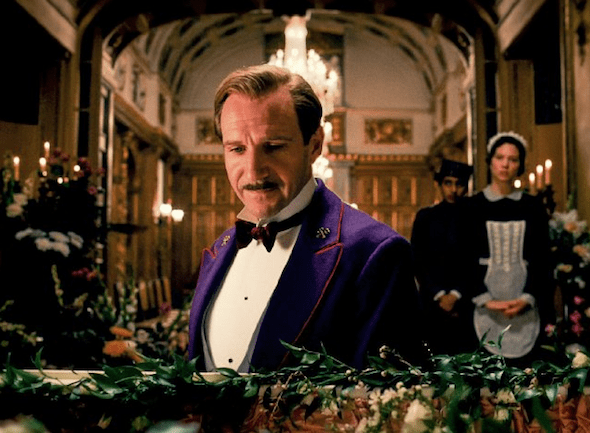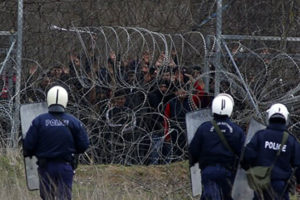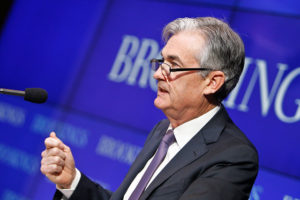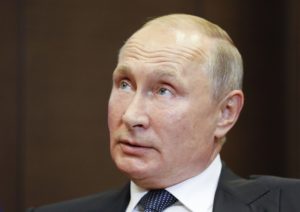Yearning for an Imagined Past
Wes Anderson's characteristically whimsical "The Grand Budapest Hotel," set in a fictitious central European nation succumbing to 1930s fascism, reflects contemporary audiences' "half-embarrassed, half-guilty wish to know something of the great convulsions of the past," film critic Stuart Klawans writes in The Nation.
Wes Anderson’s characteristically whimsical “The Grand Budapest Hotel,” set in a fictitious central European nation succumbing to 1930s fascism, reflects contemporary audiences’ “half-embarrassed, half-guilty wish to know something of the great convulsions of the past,” film critic Stuart Klawans writes in The Nation.
Klawans notes:
The first thing Anderson does in his new movie, The Grand Budapest Hotel, is go back in time, from frame story to frame story, as if to acknowledge how far he stands from his main characters, who live amid the rising fascism of Central Europe in the 1930s. The last thing Anderson does in the movie does is collapse that temporal distance abruptly, as if snapping shut a telescope. You’re in a film ruled by incongruities of space and time, in which you jump from the toylike, flat animation that provides the first view of the Grand Budapest Hotel, high in the mountains of the fictitious nation of Zubrowka, to the perspectival vastness of the hotel’s lobby, which looks as if it could swallow all of Last Year at Marienbad (except that Marienbad was shot in wide-screen, and Budapest mostly uses the squarish format of 1930s films). Anderson cuts from the absurdly coffinlike dimensions of an imperial-red passenger elevator, barely big enough to hold four people if they don’t breathe, to the equally absurd expanse of a dining room where a party of two is surrounded by an acre of empty tables. He juxtaposes the prisonlike confinement of a hotel employee’s room with the vertiginous grandeur of a real prison; he contrasts the doll-size quarters occupied by a pastry-shop assistant—in the Central Europe of myth, all cream-filled shells are works of art—with a castle’s cavernous hunting-trophy hall, which is as big as all outdoors.
Above all, Anderson plays with the incongruities of age, size, personality and acting craft of his two principal figures: the concierge of the Grand Budapest Hotel in its heyday, Monsieur Gustave (Ralph Fiennes), and the hotel’s novice lobby boy, Zero Moustafa (Tony Revolori). Middle-aged and teenaged, tall and short, worldly and naïve, overbearing and eager to please, Gustave and Zero are the latest in Anderson’s line of morally questionable older men and the intelligent lads they instruct.
… With great panache and an almost imperceptible wink, he serves up witty confections of sets, costumes and acting that are as deliberately mismatched to the terrors of this history as is Zero to Gustave. This is the film’s ultimate incongruity, meant to amuse and touch you while keeping Anderson honest about his firsthand ignorance of fascism, war and a half-century of Soviet dreadfulness. But by the time he decides to kill a few minutes by sending Gustave and Zero barreling down a winter-sports competition course—the closest thing that Universal Studios will ever find to thrill-ride potential in a Wes Anderson film—the fun has begun to wear thin. By the time he has Zero recall, in voiceover, that one of the people close to him died of “the Prussian grippe,” the fun, too, has died, along with any hope that Anderson has a grip on his material.
Read more of Klawans’ clever critique here.
— Posted by Alexander Reed Kelly.
Your support matters…Independent journalism is under threat and overshadowed by heavily funded mainstream media.
You can help level the playing field. Become a member.
Your tax-deductible contribution keeps us digging beneath the headlines to give you thought-provoking, investigative reporting and analysis that unearths what's really happening- without compromise.
Give today to support our courageous, independent journalists.






You need to be a supporter to comment.
There are currently no responses to this article.
Be the first to respond.